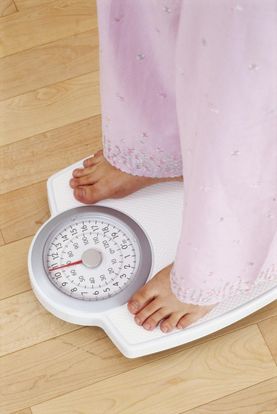11 weeks and 4 days pregnant

The fetus can be seen inside the uterus on this coloured ultrasound scan. At this stage of development, the fetus measures approximately 5.4cm (2.1in) crown to rump and weighs around 14g (0.5oz).
By around this 12th week, the midwife might be able to hear your baby’s heartbeat with a hand-held monitor.
At this stage your baby’s heart beats at approximately 120–160 beats per minute, which is at least twice as fast as your own. The heart and its internal electrical conducting system are structurally complete but its external nerve supply is still quite immature. The nerves to the heart influence its rhythm, gradually slowing the rate as the pregnancy advances.
Your baby’s heart is tiny and to maintain an adequate output it is unable to increase the amount of blood it pumps with each beat (as we can), but instead increases the number of times it beats each minute.
The abdominal cavity is large enough to hold the intestines. Whereas before they were bulging outside of your baby’s body, they now fit into her abdominal cavity. Having started to rotate while outside the body, the bowel completes its final rotation in the abdominal cavity. Once inside, the bowel position remains fixed, and its diameter increases as the loops of bowel become hollow.
If you’ve only cut down, rather than cutting it out, read on.Many smokers inhale more deeply when smoking less and their intake of damaging toxins increases. Here’s how smoking affects your baby:
The carbon monoxide, nicotine, and other substances that you inhale pass from your lungs, into your blood-stream, and cross the placenta.
Nicotine makes your baby’s heart beat faster as she struggles for oxygen, which can affect her growth rate.
Smoking increases the risk of miscarriage, premature birth, and low birthweight, and exposure to tobacco chemicals makes your baby more likely to suffer from conditions such as asthma and chest infections after the birth, which may be bad enough to warrant a hospital stay.
There is also a higher risk of cot death if you or your partner smokes. Your partner should stop too.
If you live with a smoker, you will be inhaling thousands of toxic carcinogenic chemicals that are released into the air around you from the burning end of the cigarette and the exhaled smoke.
Several studies have confirmed that passive smoking can damage the baby’s health and increase the risk of miscarriage and premature birth.
If you’re carrying twins, you’re likely to have put on some weight by now, perhaps around 5kg (11lb). Early weight gain is usually a good thing, especially in your case, as this is a vital time for the formation and development of your baby’s organs. As a rough guide, a good recommended weight gain is:
For twins, total weight gain of 16–20kg (35–44lb), preferably 11kg (24lb) by week 24, then a gradual increase until the birth.
For triplets, a total weight gain of 23–27kg (50–60lb), preferably 16kg (35lb) by week 24, then a gradual increase until the birth.
For quads, total weight gain of 31–36kg (68–79lb), ideally most of it by week 24.

Be the first to support
Be the first to share
Comment (0)
Related Blogs & Vlogs
No related events found.
Loading more...